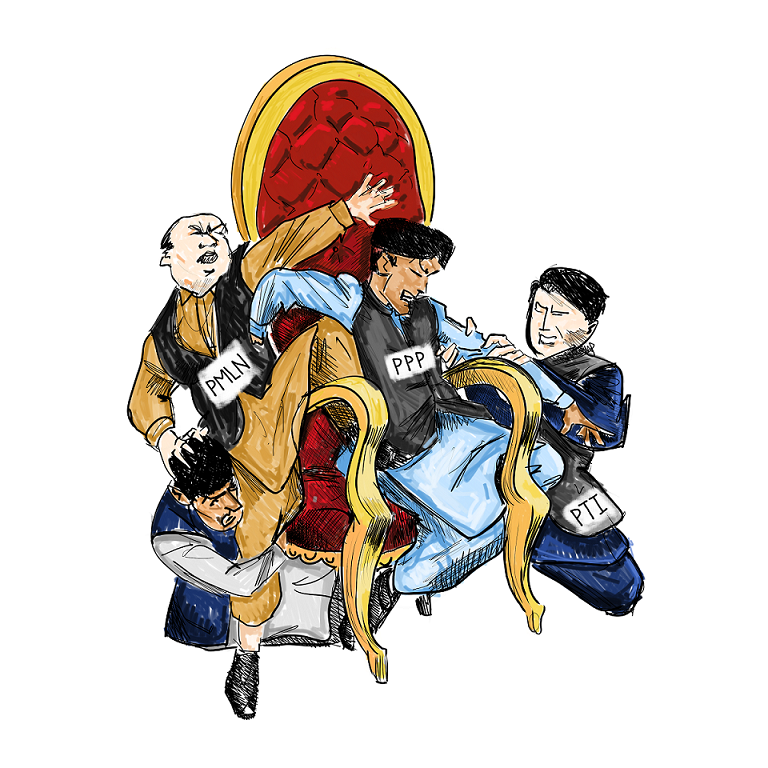Pakistan Tehreek-i-Insaf will lose 26 seats reserved for women and minorities in National Assembly and a whopping 61 in provincial assemblies of Pakhtunkhwa, Punjab and Sindh if independent status of its February 8 winners remains unchanged.
The pool of reserved seats in each elected house is divided among political parties in proportion to the number of seats that they have won in a general election. Only the political parties contesting under an election symbol qualify for these seats and their shares are calculated after subtracting number of independent winners from the total strength of a house.
According to the Elections Act 2017, the Election Commission shall notify final results within 14 days after the polling day that is by 22nd February and the elected independents are free to join any political party within three days of this notification or by 25th February. After this, the Commission shall consolidate number of winners of each party and accordingly calculate and notify each party’s share in reserved seats. An independent winner joining a party before the set date is counted in that party’s tally for the purpose of these calculations.
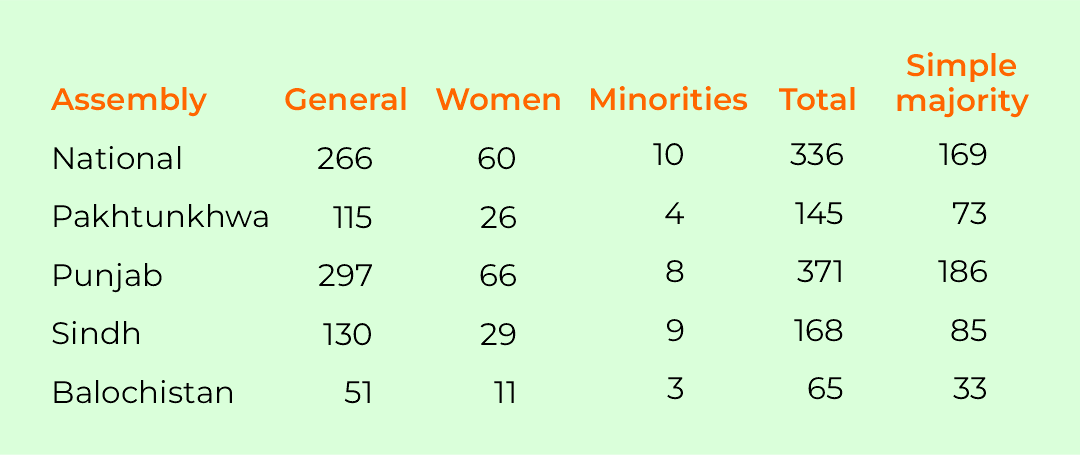
PTI is trying to strike a deal with a friendly political party that is listed with the ECP. It will then ask its members who have won as independents to join that party. This will change their legal status and enable the PTI’s surrogate party to claim share in reserved seats. This will stop PTI’s rivals from making hay of the reserved seats allocation.
Whether or not PTI will manage to spring another surprise and retain its share of reserved seats will become clear in a week from now. And this will have implications on party equations in elected houses when they meet in last days of this month to form governments.
Following is a house-by-house account of these equations in both scenarios, that is, if PTI gets its share in reserved seats and if it doesn’t.
National Assembly: On a wing and a prayer
According to the preliminary results, independent candidates have won on 101 of the 265 national seats on which elections were held. PTI’s website claims that the party had awarded tickets to 93 of these but as the Commission had declared its intra-party elections null and void and refused to allot it a party symbol, all of them had contested as independents.
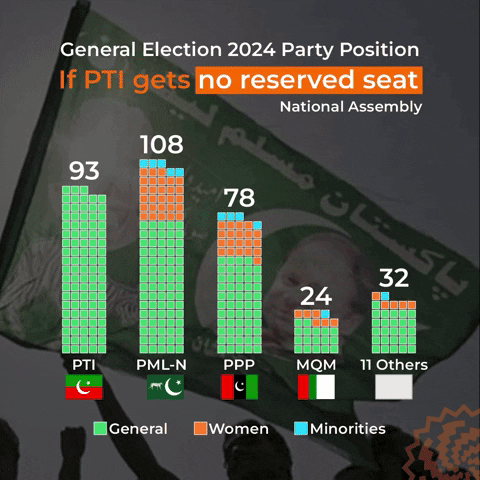
If PTI can stop its claimed members from joining another party and also finds a way to reverse their independent status, it will win 22 from the pool of 60 seats reserved for women and four of ten reserved for minorities. Its total tally in the National Assembly will thus rise from 93 to 119 (93 general+22 women+ 4 minorities).
The party, however, will still be short of 50 votes to get its prime minister elected which requires 169 members. It can make up this gap in two ways. One, by winning support of all the smaller parties in the house including eight independent members that were not backed by it and two, by forming an alliance with PPPP having 68 members (54 general+12 women+2 minorities). Their combined strength will be 187.
On the flip side of the same scenario, a PML-N and PPP alliance will be five votes short of getting their prime minister elected. Winning over independent winners, whether or not supported by PTI before distribution of reserved seats, can substantially ease this equation for the two parties.
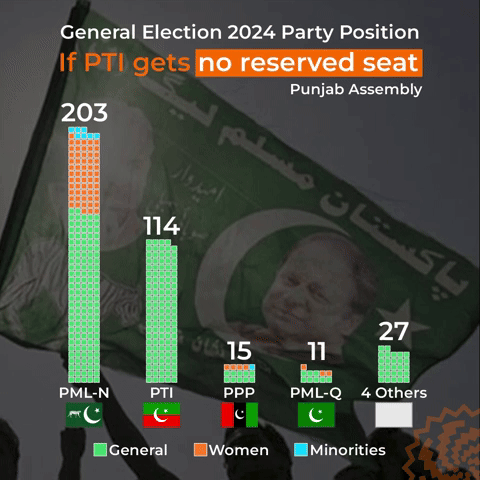
PML-N’s tally in this situation will stand at 96 (75 general+18 women+3 minorities) and the only chance for it to form government will also lie in allying with PPPP. The alliance’s total (96+68=164) will still be five behind the simple majority mark that could be bridged by eight independents not backed PTI and/or other smaller parties of which MQMP will have 22 members (17 general+4 women+1 minority).
If PTI fails to get back its party status, it will not be allocated any of the reserved seats and from its presumed share of 22 women seats, ten will be picked up by PML-N (in addition to 18 that it will get against its wins in 75 constituencies), eight by PPPP, two by MQMP, one by JUI and one by another party. Similarly, its share of four seats reserved for minorities will be equally divided between PML-N and PPPP.
This will raise PML-N’s tally in National Assembly to 108 and PPPP’s to 78 putting their combined strength 17 votes above the simple majority mark. In fact, winning over support of MQMP (17 general+6 women+1 minority) and eight independent winners (not backed by PTI) can bring two-third majority within reach of the PML-N and PPPP combine.
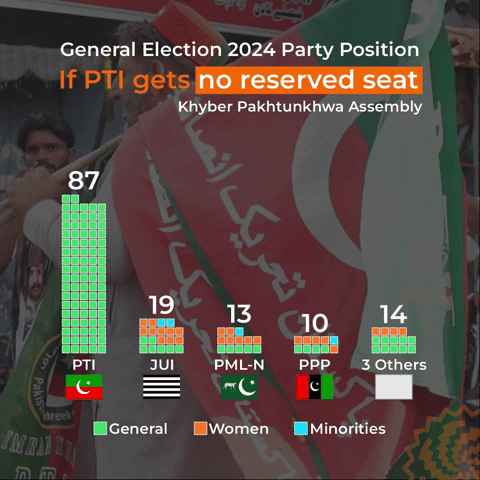
This seemingly easier scenario for the PML-N and PPPP alliance will rest on legal status of their shares of reserved seats which may be subjected to a legal battle.
Punjab Assembly: PMLN? Yes, but …
There are 138 independent winners in elections to the Punjab Assembly and 114 of these are claimed by PTI as its members while the rest 24 were not backed by it and are ‘real independents’. There were 30 such independent winners in general elections 2018.
If PTI had the party status, it would have been awarded 28 of 66 seats reserved in Punjab Assembly for women and half of the eight seats for minorities taking its total to 146 - 40 short of simple majority. PTI will need support of almost all the other winners (except PML-N) to form a government in Punjab.
On the hand PML-N will still be close to the simple majority mark of 186 members by adding 33 women seats and four minority seats to its 137 constituency winners with its total standing at 174 - 12 short of simple majority. With 24 independents up for grabs before allocation of reserved seats and many already announcing joining PML-N, the party can form the government in the country’s largest province without much difficulty.
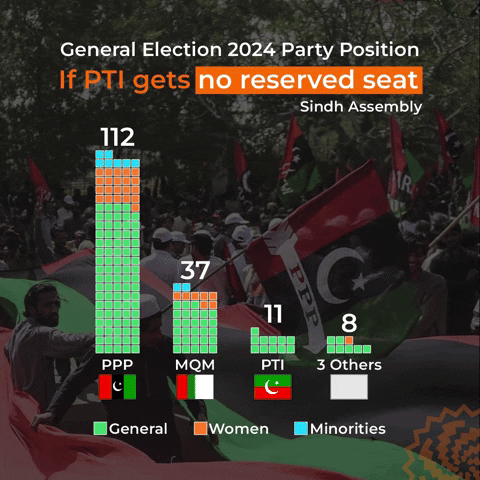
In the scenario of PTI’s elected members remaining independent, PML-N will get a hefty share of 59 of 66 women seats and all but one of eight of minority seats. This will bring its total to 203, 17 more than the minimum required to form the government and yet this does not include the independents who are and may be joining the party before allocation of reserved seats.
In summary, whatever happens to allocation of reserved seats to PTI, PML-N is best placed to form government in Punjab. It will, however, have to woo in 12 independents now or will need support of 13 PPPP members (10 general+3 women) latter.
Pakhtunkhwa Assembly: No holds barred PTI
Khyber Pakhtunkhwa Assembly has a total strength of 145 members – 115 elected from constituencies and 26 reserved for women nominees of parties and four for religious minorities. This sets 73 as the simple majority mark while PTI-backed independents have won in a total of 87 constituencies or 14 more than the number required to form government in the province.
So whether or not PTI is allocated a share in reserved seats, nothing can stop the party from forming government in Pakhtunkhwa.
However, the scenario of PTI not being allocated any reserved seats will result in a ridiculous situation when 26 seats reserved for women will be allocated among five political parties that have collectively won elections in just 19 constituencies of the province!
Also Read
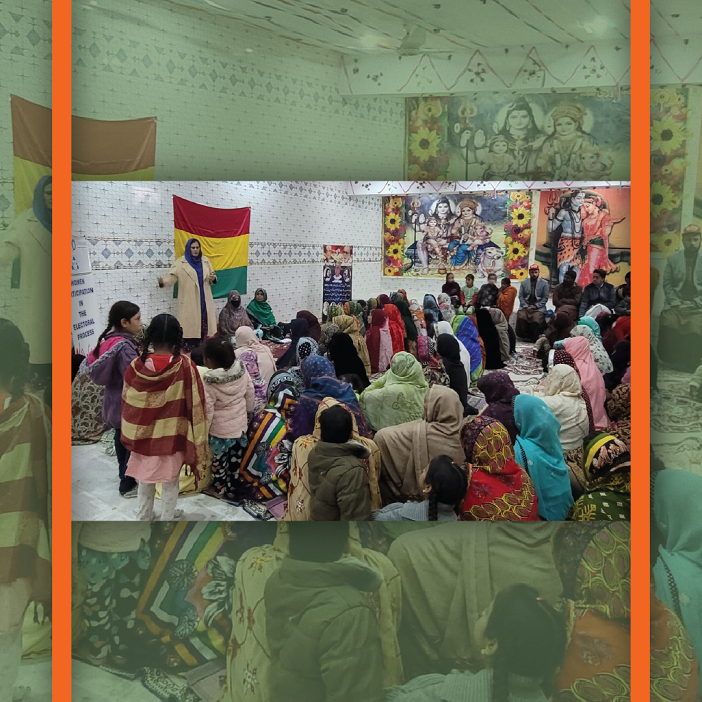
Why minorities aren't picked by political parties in elections
There are seven other independent winners in the province who were not backed by PTI and they are likely to join one or the other party before allocation of reserved seats. In this likely scenario, the total strength of all the legally-recognized political parties will rise to 26.
So each party will get as many of the 26 seats reserved for women as its constituency winners. Win one, get one!
For the first time, women members will have an equal share in KP’s opposition benches. Not sure, whether and how to celebrate this rather twisted victory of gender equality.
Sindh Assembly: Smooth sailing for PPPP
Pakistan Peoples Party is as comfortable in Sindh as PTI-Independents are in Pakhtunkhwa. The provincial assembly has a total strength of 168 members (130 general+29 women+9 minorities) setting the simple majority mark at 85.
PPP has won in 84 constituencies, MQMP in 28 and PTI backed independents in 11. There are three other independent winners in the province also.
If PTI is not allocated any share in reserved seats, PPP’s total will stand at 112 and in other scenario it will drop to 109. In both cases, PPP faces no challenge in Sindh as its strength remains close to two-third of the house.
The only difference in the unlikely case of PTI being awarded reserved seats will be that PPP’s women nominee on priority 20 and 21 and MQM’s on priority 7 will fail to make it to the elected house.
Balochistan Assembly: Old rule book stays supreme
The mandate in Balochistan is as divided as ever with PPPP and JUI winning 11 each of the total 51 constituency seats and PML-N securing 10. There are only six independent winners and none was backed by PTI so the province faces no ifs and buts related to allocation of reserved seats.
Published on 20 Feb 2024
